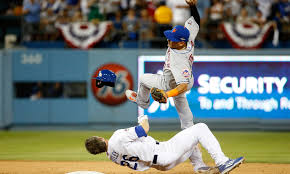What happened to Mets shortstop Ruben Tejada via a hard, late takeout slide by the Dodgers Chase Utley in Saturday’s National League playoff game is every middle infielder’s greatest fear.
Catching a throw at second base, touching the base, gripping and throwing the ball to first and jumping up or out of the way before an elite, 200-pound athlete with a running start, metal cleats on his shoes and angry intent on his mind barrels into your lower body and knocks you into left field, as they say, is not easy nor for the faint of body or will.
Tejada was lined up, vulnerable — and wiped out.
Utley, a second baseman, slid straight into Tejada’s legs as the shortstop, after catching a flip from his second baseman at an awkward angle, tried to jump-spin at the bag and throw to first. Instead, Utley flipped Tejada up and over, breaking the shortstop’s fibula.
He was carted off, his leg in an air cast, Utley was ruled safe via a replay challenge, and the Dodgers rallied past the Mets to even their five-game series at 1-1.
You can find ample pages out there dissecting the play, focused on whether Utley was “dirty” or within the rules drilling Tejada as he did. I didn’t see the play live, but I’ve watched it numerous times this morning.
My humble take:
Utley was not dirty. Hyper-aggressive, yes, dirty, no. He employed a legal tactic, albeit from baseball’s Neanderthal days.
Tejada was unfortunate.
And it is all Major League Baseball’s fault.
Like it or not, Utley did what baseball’s interpretive rules give him freedom to do, slide hard into the second-base pivot man. It is interpretive because the rules leave it to the umpires to judge whether or not a runner clearly goes out of his way to interfere with a fielder making a play.
In this case, the issue is whether Utley abandoned all thought of reaching second safely and went directly for Tejada.
Of course, he went after Tejada — because baseball has allowed runners to go after middle infielders for more than a century.
Almost even with the bag, i.e. dangerously late, Utley slid to the right, never touching the base as he undercut Tejada. The irony is Tejada also never touched the bag after he caught the flip.
And it was all made worse for the Mets when Tejada’s failure to touch second was detected on replay and Utley was ruled safe — even though he left the field still without having touched second. And even though umps — wink, wink — routinely allow fielders to simply be “in the neighborhood” of second base, rather than actually touching the base, to record an out before throwing.
It is a mash-up of anger, hypocrisy, bruised egos and bodies that will reach through the rest of this series – that is, beanballs and one or more bench-clearing “brawls” are coming.
And it is one that I believe, thanks to the postseason spotlight thrown on this play and the severity of Tejada’s injury, will resonate through baseball with an overdue rules change.
I believe Utley when he says he didn’t mean to hurt Tejada, only to prevent him from turning a key double play. But I also believe the collision proves the arcane folly of keeping a play like this tacitly within the rules.
The takeout slide has been legislated out of high school and college baseball, to no loss of competitive intensity. As well, MLB a couple years ago banned the ability of base-runners charging to home plate — a la Pete Rose decades ago in the all-star game — to drop their head and shoulders like a linebacker and blast a catcher to prevent a tag or dislodge the ball.
The impetus was the knee that Giants’ star catcher Buster Posey had shredded on such a play. MLB adopted the high school/college rule; catchers can’t block the plate without the ball, and runners must slide into home.
That rule has saved needless injuries at the plate, just as the amateur rule that makes runners slide directly into second — and not detour to either side as Utley did — has prevented broken fibulas throughout the game. It’s also made the controversial “neighborhood” judgment no longer necessary.
It seems to me all that is good, and an obvious overdue adjustment needed at the top level of a sport where seven-, eight- and nine-figure athletes are the brilliant lifeblood.
Gamblin’ Pete Rose won’t understand. That is something we’ll just have to live with.


Great article Tom, spot on.